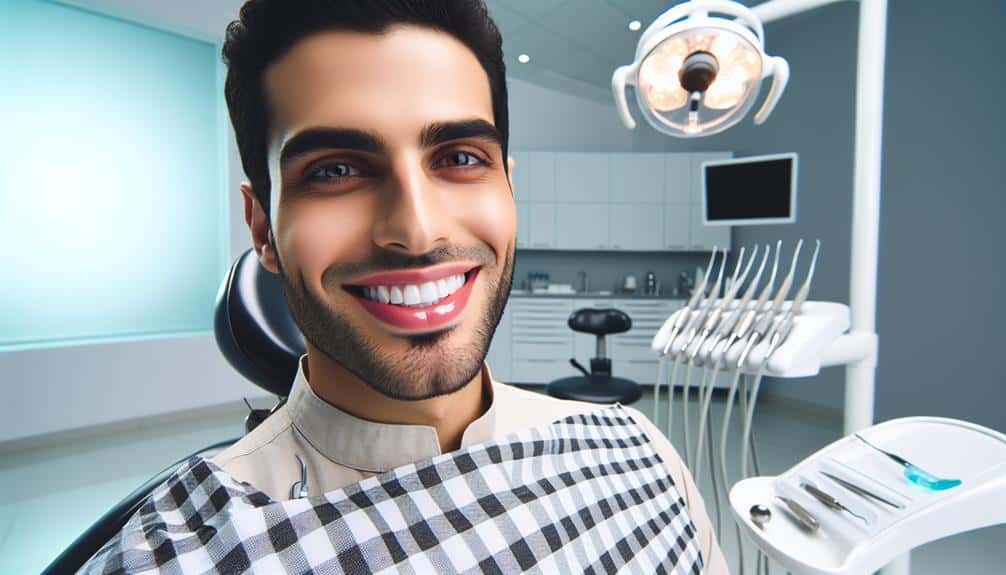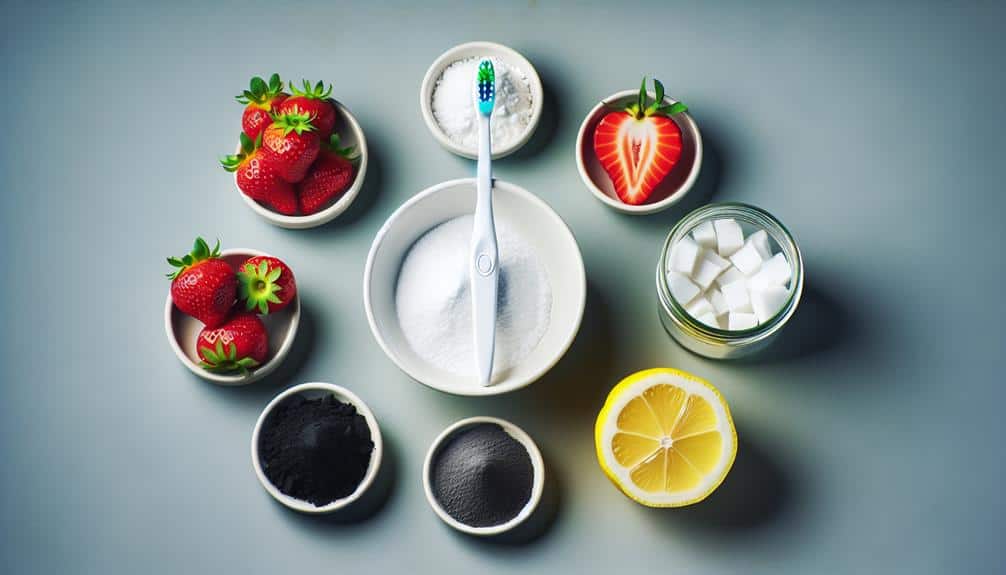Brighten your smile and boost your confidence with transformative cosmetic dentistry whitening secrets. Effectively remove stubborn stains caused by daily culprits like coffee, tea, and red wine, enhancing your aesthetic appeal and oral health simultaneously. Discover the benefits, various procedures, factors affecting results, maintenance tips, and differences between professional and at-home whitening options. Uncover how these secrets can help you achieve a brighter, whiter smile effortlessly.
Key Points
- Transform your smile with professional cosmetic dentistry whitening for immediate and significant results.
- Consider in-office whitening for quick and effective outcomes with high-concentration bleaching agents.
- Maintain whiter teeth with good oral hygiene, regular cleanings, and avoiding staining foods and drinks.
- Understand factors affecting whitening results, including initial shade, staining type, and post-care adherence.
- Choose between professional or at-home whitening based on desired results, cost, and treatment duration.
Benefits of Cosmetic Dentistry Whitening
Discover the transformative benefits of cosmetic dentistry whitening for a brighter, more confident smile. Achieving a dazzling smile not only enhances your aesthetic appeal but also boosts your smile confidence greatly. Cosmetic dentistry whitening procedures can effectively remove stubborn stains caused by coffee, tea, red wine, and other culprits, giving you a radiant and more youthful appearance. By brightening your teeth, you can experience a newfound sense of confidence that radiates through your smile.
Furthermore, cosmetic dentistry whitening treatments are tailored to suit your specific needs, ensuring personalized care and best results. Whether you opt for in-office whitening sessions or at-home whitening kits prescribed by your dentist, the benefits remain the same – a luminous smile that enhances your overall appearance. Embracing cosmetic dentistry whitening not only improves the color of your teeth but also contributes to your overall oral health, as it often motivates individuals to maintain good dental hygiene habits to prolong the effects of the whitening treatments.
Types of Teeth Whitening Procedures
Various types of teeth whitening procedures are available to help you achieve a brighter, more radiant smile. Here are some popular options to ponder:
- In-Office Whitening: Professional whitening treatments performed by a dentist in a clinical setting offer quick and effective results. This method typically involves the application of a high-concentration bleaching agent that's activated by a special light.
- At-Home Options: Take-home whitening kits prescribed by your dentist allow you to whiten your teeth at your convenience. These kits usually include custom-made trays and a lower-concentration whitening gel to be applied over a few weeks.
- Natural Remedies and DIY Kits: Some people prefer natural methods or over-the-counter whitening kits. These may include ingredients like baking soda, hydrogen peroxide, activated charcoal, or whitening strips. While these options can be cost-effective, their efficacy may vary, and it's crucial to consult with your dentist before use to ensure safety and effectiveness.
Factors Affecting Whitening Results
Factors that can impact the results of teeth whitening procedures include the initial shade of your teeth, the type of staining present, and your adherence to post-whitening care instructions.
The initial shade of your teeth plays a vital role in determining the outcome of the whitening treatment. Darker teeth may require more sessions or stronger whitening agents to achieve the desired results.
The type of staining present on your teeth, whether it's extrinsic (on the surface) or intrinsic (within the tooth), also affects how well your teeth respond to whitening. Extrinsic stains from dietary habits and lifestyle choices like consuming coffee, tea, or red wine may be easier to remove compared to intrinsic stains caused by factors like genetics and age.
Additionally, your commitment to post-whitening care instructions is essential for maintaining the results. Following guidelines such as avoiding staining foods and drinks, practicing good oral hygiene, and attending regular dental check-ups can help prolong the effects of the whitening treatment.
Genetics and age factors can influence how your teeth respond to whitening as well. Understanding these factors can help you manage your expectations and optimize the results of your teeth whitening procedure.
Maintenance Tips for Whiter Teeth
To maintain the results of your teeth whitening treatment, it's important to implement effective strategies for preserving the whiteness of your smile over time. Here are some maintenance tips for whiter teeth:
- Essential Care: Regular dental check-ups and cleanings are essential in maintaining your white smile. Your dentist can identify any potential issues early on and provide professional cleanings to remove surface stains.
- Healthy Lifestyle Habits: Avoiding foods and drinks that stain your teeth, such as coffee, tea, and red wine, can help prevent discoloration. Additionally, practicing good oral hygiene, including brushing and flossing daily, can contribute to keeping your teeth white.
- Use Whitening Toothpaste: Incorporating a whitening toothpaste into your oral care routine can help remove surface stains and maintain the brightness of your teeth. Look for toothpaste with the ADA Seal of Acceptance for safe and effective whitening.
Professional Vs. At-Home Whitening Options
When contemplating teeth whitening options, it's crucial to evaluate the benefits and differences between professional and at-home treatments for optimal results. Professional whitening procedures are typically conducted in a dental office by a trained dental professional. They often involve stronger whitening agents and specialized equipment, which can lead to more immediate and significant results compared to at-home options. The professional outcomes are often more consistent and long-lasting, making them a preferred choice for those seeking a dramatic improvement in their smile.
On the other hand, at-home whitening options usually consist of over-the-counter whitening kits or products recommended by a dentist for home use. While these methods are generally more cost-effective than professional treatments, they may take longer to show noticeable results and may not be as effective in treating severe discoloration. It's vital to assess the cost comparison between professional and at-home options along with the desired level of whitening results when deciding on the most suitable treatment for your needs.
Frequently Asked Questions
Can Teeth Whitening Procedures Cause Tooth Sensitivity or Damage to the Enamel?
Teeth whitening procedures can sometimes lead to tooth sensitivity or enamel damage. It's important to be aware of these potential side effects and risks. Consulting with your dentist can help minimize any negative impacts on your oral health.
Are There Any Age Restrictions for Undergoing Cosmetic Dentistry Whitening Treatments?
When it comes to age restrictions for cosmetic dentistry whitening treatments, safety is a priority. Dentists typically advise waiting until adulthood for such procedures to guarantee the best benefits without potential complications associated with developing teeth.
How Long Do the Results of Teeth Whitening Typically Last?
To maintain your whitening results long term, it's important to follow proper whitening maintenance. Typically, the effects of teeth whitening can last from six months to two years, depending on your habits and the type of treatment you choose.
Can Certain Lifestyle Habits, Such as Smoking or Drinking Coffee, Affect the Longevity of Teeth Whitening Results?
Certain lifestyle habits, like smoking or coffee consumption, can greatly impact the longevity of teeth whitening results. To maintain a bright smile, consider reducing these habits, using whitening toothpaste, and visiting your dentist for touch-ups.
Are There Any Natural Remedies or DIY Methods That Can Help Maintain Whiter Teeth Between Professional Whitening Treatments?
To maintain whiter teeth between professional whitening treatments, try natural remedies like baking soda or DIY methods such as oil pulling. These preventive measures, along with good oral hygiene practices, can help preserve your bright smile.




